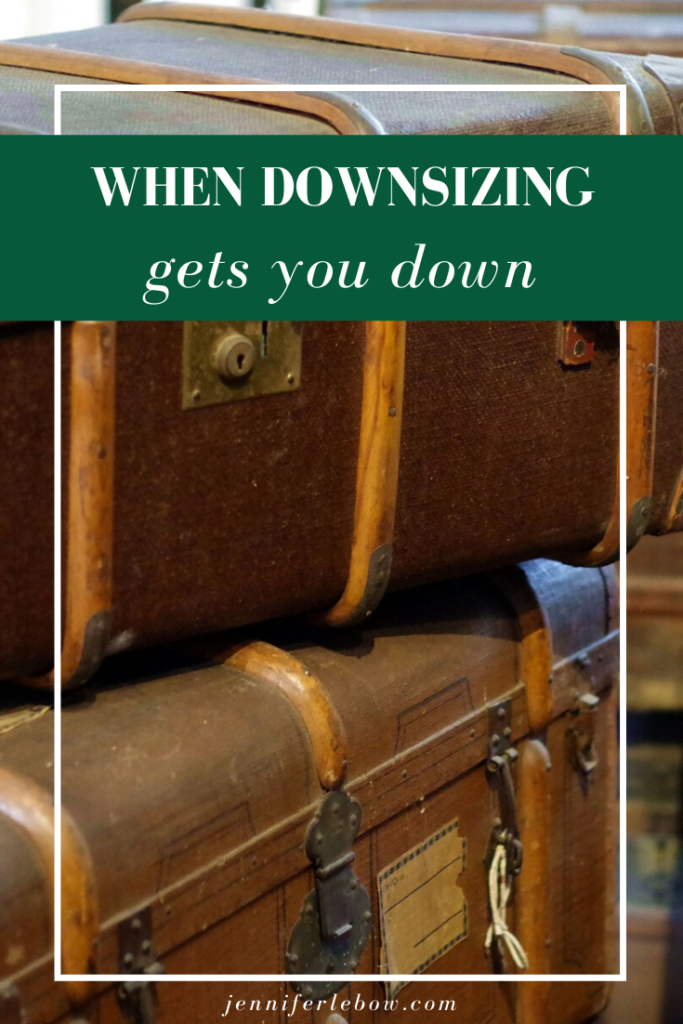
Why do people downsize?
There are many reasons people move into smaller and, usually, less costly residences. It can be a choice to have less to take care of. Sometimes people want to move into a lower maintenance situation, like a condo, especially if it’s within easy walking distance to desired amenities. Maybe the clutter-free lifestyle appeals to you and you don’t want to make any larger a footprint than necessary. However, it is often less of a choice and more of a financially-motivated decision. Note that the opposite of “moving up” is not usually referred to as “moving down”, but, rather “downsizing”. Click here for things to consider when “moving down”.
The stigma of downsizing
For the majority of people who find themselves in a position where downsizing is a necessity rather than a choice, the emotional component is significant. If a downsize occurs as a result of a change in finances, it can be humiliating. While it shouldn’t be, people may be embarrassed about a job loss or perceived inability to manage money well. Not being able to continue to live in a certain style can result in unwelcome social stigma. It’s not difficult to understand how, in this example, downsizing could bring you down.
Seniors are often prompted to move from a practical standpoint; property care and maintenance may have become too difficult, or living independently may no longer be feasible. Even if the financial picture hasn’t changed (which is rare, since older people are often on a fixed income), the loss of independence that comes with physical age is frustrating. Change can also be especially hard for older people. In addition, few of us want to face the fact that we can no longer care for ourselves independently. Another reason downsizing may get you down. For more information directly pertaining to downsizing for seniors, click here.
Acknowledge the negative of downsizing
Leaving
Don’t pretend that downsizing doesn’t have its drawbacks. You may be leaving friends, neighbors and family behind whom you care about and who make up much of the social fabric of your life. You are probably leaving memories of your previous home, which can be hard. Most people have to discard possessions including furniture, artwork, clothing and all the things that are kept as long as there is storage to keep them. Giving or throwing away your personal belongings is very challenging. There’s no point in sugar-coating it: it’s hard. Here are some suggestions on how to cope.
Adjusting to the new place
Once you move into your smaller, less expensive new home, you will be aware that it is smaller and less expensive. The size means less room to live in, less storage space and maybe even less room for guests to visit (which may feel very important as you haven’t yet developed a local social sphere). If you new home is more modest in cost, you might look around and feel like you can longer keep up with the Joneses, which may be an unwelcome reality. You will also have to learn where to go for services (drug store, dry cleaner, car repair) as well as where to find good substitutes for favorite retail and dining spots you left behind.
Try to see the advantages of downsizing
While, without a doubt, it’s not easy to step down, there may actually be some benefits. Less to clean, lower utility bills and usually, less maintenance. Mowing the lawn, trimming the trees, plowing the driveway–most downsizing moves lead to less of those tasks and their associated costs. Setting up your new home with less stuff, overall, may feel more organized and simpler. The lifestyle of living with fewer things is increasing in popularity everywhere. Maybe you can embrace it and find that the reduced size as well as the fewer possessions don’t negatively impact your lifestyle.

